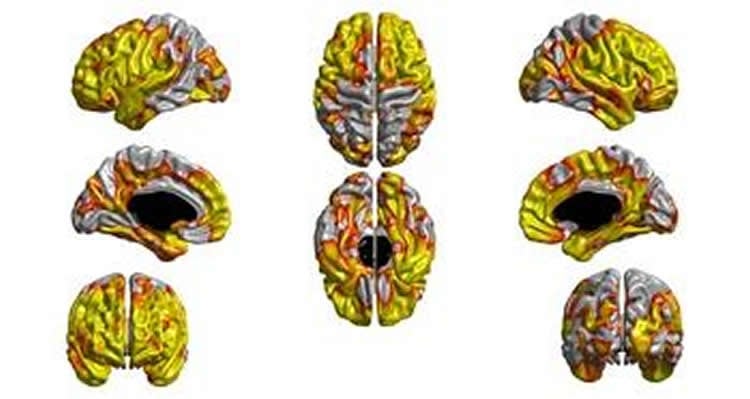Years ago, children were warned that smoking could stunt their growth, but now a major study by an international team including the Montreal Neurological Institute at McGill University and the University of Edinburgh shows new evidence that long-term smoking could cause thinning of the brain’s cortex. The cortex is the outer layer of the brain in which critical cognitive functions such as memory, language and perception take place. Interestingly, the findings also suggest that stopping smoking helps to restore at least part of the cortex’s thickness.
The study involved 244 male and 260 female subjects—five times larger than any previous similar research on smoking and cortical thickness. Their average age was 73. The test group included current smokers, ex-smokers and non-smokers. All of the subjects were examined as children in 1947 as part of the Scottish Mental Survey. Researchers used health data gathered during recent personal interviews with the subjects, and also analyzed data from MRI scans showing the current state of the subjects’ brain cortices.
“We found that current and ex-smokers had, at age 73, many areas of thinner brain cortex than those that never smoked. Subjects who stopped smoking seem to partially recover their cortical thickness for each year without smoking,” says the study’s lead author Dr. Sherif Karama, assistant professor of psychiatry at McGill University, psychiatrist at the Douglas Mental Health University Institute and an affiliate of the Montreal Neurological Institute. The apparent recovery process is slow, however, and incomplete. Heavy ex-smokers in the study who had given up smoking for more than 25 years still had a thinner cortex.
Although the cortex grows thinner with normal aging, the study found that smoking appears to accelerate the thinning process. A thinner brain cortex is associated with adult cognitive decline.

“Smokers should be informed that cigarettes could hasten the thinning of the brain’s cortex, which could lead to cognitive deterioration. Cortical thinning seems to persist for many years after someone stops smoking,” says Dr. Karama.
The study was conducted at the Montreal Neurological Institute McGill University and the University of Edinburgh’s Centre for Cognitive Ageing and Cognitive Epidemiology. Other participating institutions included the McGill University Health Centre, The Douglas Mental Health University Institute and Alzheimer Scotland Dementia Research Centre.
Contact: Anita Kar – McGill University
Source: McGill University press release
Image Source: The image is credited to Molecular Psychiatry, S Karama, IJ Deary et al. and is adapted from the McGill press release
Original Research: Full open access research for “Cigarette smoking and thinning of the brain’s cortex” by S Karama, S Ducharme, J Corley, F Chouinard-Decorte, J M Starr, J M Wardlaw, M E Bastin and I J Deary in Molecular Psychiatry. Published online February 10 2015 doi:10.1038/mp.2014.187
Cigarette smoking and thinning of the brain’s cortex
Cigarette smoking is associated with cognitive decline and dementia, but the extent of the association between smoking and structural brain changes remains unclear. Importantly, it is unknown whether smoking-related brain changes are reversible after smoking cessation. We analyzed data on 504 subjects with recall of lifetime smoking data and a structural brain magnetic resonance imaging at age 73 years from which measures of cortical thickness were extracted. Multiple regression analyses were performed controlling for gender and exact age at scanning. To determine dose–response relationships, the association between smoking pack-years and cortical thickness was tested and then repeated, while controlling for a comprehensive list of covariates including, among others, cognitive ability before starting smoking. Further, we tested associations between cortical thickness and number of years since last cigarette, while controlling for lifetime smoking. There was a diffuse dose-dependent negative association between smoking and cortical thickness. Some negative dose-dependent cortical associations persisted after controlling for all covariates. Accounting for total amount of lifetime smoking, the cortex of subjects who stopped smoking seems to have partially recovered for each year without smoking. However, it took ~25 years for complete cortical recovery in affected areas for those at the mean pack-years value in this sample. As the cortex thins with normal aging, our data suggest that smoking is associated with diffuse accelerated cortical thinning, a biomarker of cognitive decline in adults. Although partial recovery appears possible, it can be a long process.
“Cigarette smoking and thinning of the brain’s cortex” by S Karama, S Ducharme, J Corley, F Chouinard-Decorte, J M Starr, J M Wardlaw, M E Bastin and I J Deary in Molecular Psychiatry. doi:10.1038/mp.2014.187.






